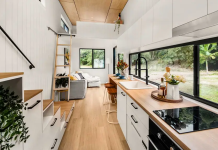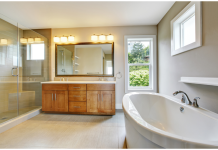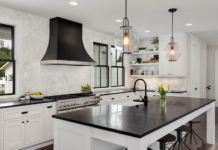Home renovation is one of the best ways to add value to your property when you’re planning to sell it in the future. The key to getting the most return on your investment is by making renovations that will truly add value.
One thing you should keep in mind when planning how to spend your renovation budget is that the best renovations are the ones that will be used often and benefit you every day, not just when you have guests over. Focus on making renovations that will provide more value to your family’s lifestyle, so it’ll translate into a higher resale value for your home.
Which Part of Your Home Should You Renovate?
As you plan your renovation budget, think about which rooms have the highest return on investment. For example, kitchen renovations are one of the best ways to add value to a home while adding more livable square footage. Kitchens also tend to be consistently used by families for social gatherings and other common activities, so it’s an excellent choice for spending extra money on if you have it to spare.
There are many areas that can benefit from upgrades or additions, so it’s important to take a look at all of your options for spending renovation money wisely. Video game rooms, media rooms, basements and garages are just some other areas that can benefit from upgrades or alterations that will be used often enough to justify the expense.
The key is to focus on making renovations that will provide regular use and enjoyment for you and your family. Some people even opt to work with an interior decorator because they know how costly home improvements can be. Interior designers can come up with inexpensive ways of giving any room in your house a facelift without breaking your bank account.
1. Prioritize Renovations with High ROI
Creating an ideal home renovation plan involves prioritizing renovations with the highest Return on Investment (ROI). Look at whether there are elements of your property that are causing measurable harm or inconvenience. These are the elements that will often provide the highest ROI.
The most important thing is to prioritize common areas of your house over those used exclusively within a single person’s bedroom or living space. One way to think about this is by imagining the worst-case scenario as you plan for renovations: what if someone moves out of the home? In cases where a tenant leaves, it may not be worth doing costly repairs on their individual rooms. Instead, focus on making renovations that can benefit multiple tenants at once. For example, kitchen and bathroom upgrades can benefit all tenants in a rental property.
2. Create a Savings Plan
Make sure that you have a solid budgeting plan before you start any type of home renovation. For example, if you are planning to sell your home sometime in the next few years, it’s important to consider what kind of renovations will be most attractive to potential buyers.
If you want to take advantage of an upcoming market, focus on renovations that have high ROI and can potentially raise the property value by 5% or more. It’s also important to create a sustainable savings strategy for all future needs. It’s easy to lose track of how much money you’ve spent when renovating your home.
Consider taking out a loan or leveraging equity in your current property if you don’t have the cash on hand for a renovation. For example, as a senior homeowner, you might opt for a reverse mortgage to help manage costs over the next several months (you can see how much you’d qualify for based on this calculator).
3. Get Quotes from Multiple Contractors
Get at least 3 estimates from multiple contractors who are capable of completing the renovations you want before making your final decision. And make sure that they know to address any other issues you might have, not just the ones listed on their quote. It’s important to work with a contractor who can provide you with all of your renovation needs at once. If they don’t offer additional services like cleaning after construction, it’s time for them to go.
4. Watch Your Spending
The key to spending less money is by managing every dollar that comes into and out of your bank account. One good way to do this is by using a home renovation app that helps track how much money goes in and out of your bank account so you can be more mindful about how much money you spend each month on rent, utilities, and on renovation supplies.
5. Know When to Move On
At some point in the renovation process, you will reach a fork in the road where it’s time to either move on or keep going. If your budget runs out but your project isn’t complete, you have two options: either cut back on expensive renovations so that everything else can get done, or call it a day and finish up later. It’s always better to stop while things are still functional – nobody wants to live in a construction zone.
In conclusion, quality is the key to any renovation project, no matter how small or large it may be. A good way to do this is start with a solid budgeting plan and keep track of all your expenses throughout the renovation process. You can also prioritize renovations with high ROI. These are typically elements of your home that are causing measurable harm or inconvenience, but they can also help raise property value if you’re planning to sell in the near future.
Get multiple quotes from contractors before deciding on who to work with, then watch what you spend by using a home renovation app. Finally, don’t forget about creating sustainable savings plans for future projects.










































